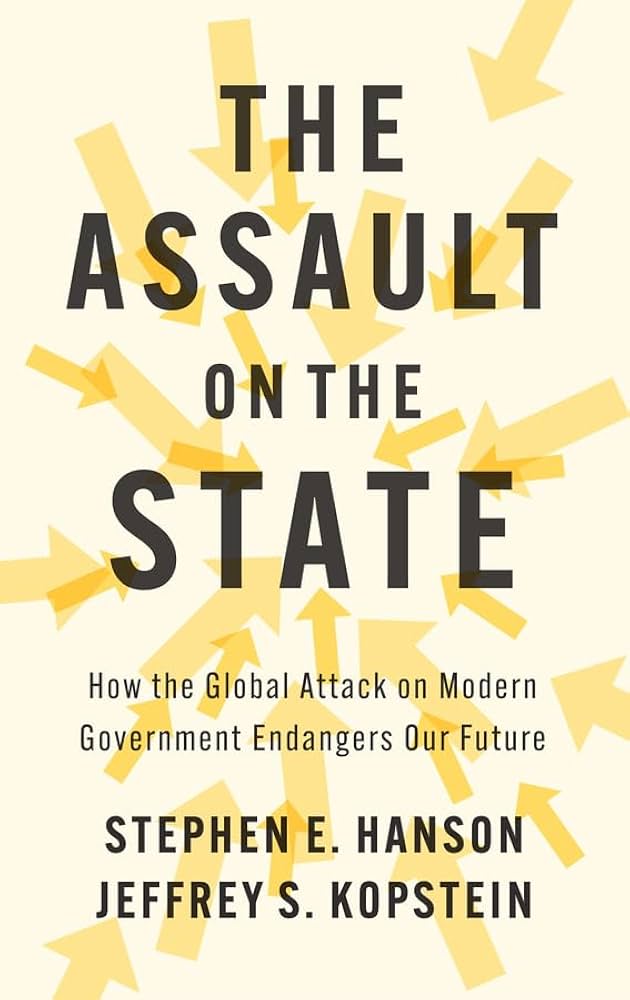The Assault on the State
 Stephen E. Hanson, Lettie Pate Evans Professor of Government at William & 玛丽, is the author of numerous scholarly books and articles on Russian, post-communist, and European politics in comparative perspective. He and his coauthor Jeffrey Kopstein have just published The Assault on the State, in which they offer an impassioned plea to defend modern government against those who seek to destroy it. They dissect the attack on the machinery of government from its origins in post-Soviet Russia to the core powers of Western democracy. The dangers of state erosion imperil every aspect of our lives. Hanson and Kopstein outline a strategy that can reverse this destructive trend before humanity is plunged back into the pathological personalistic politics of premodern times.
Stephen E. Hanson, Lettie Pate Evans Professor of Government at William & 玛丽, is the author of numerous scholarly books and articles on Russian, post-communist, and European politics in comparative perspective. He and his coauthor Jeffrey Kopstein have just published The Assault on the State, in which they offer an impassioned plea to defend modern government against those who seek to destroy it. They dissect the attack on the machinery of government from its origins in post-Soviet Russia to the core powers of Western democracy. The dangers of state erosion imperil every aspect of our lives. Hanson and Kopstein outline a strategy that can reverse this destructive trend before humanity is plunged back into the pathological personalistic politics of premodern times.
Q: Your new book is not only timely, but it also is a unique analysis of the subject, bringing to bear several disciplines -- history, political science, sociology. Who is your collaborator?
I have to begin any discussion of the book by thanking my coauthor, Professor Jeffrey S. Kopstein at the University of California at Irvine. Jeff and I have been friends and collaborators since we met in graduate school at U.C. Berkeley in the 1980s, and we are in every sense jointly responsible for the research and writing of The Assault on the State.
University of California at Irvine. Jeff and I have been friends and collaborators since we met in graduate school at U.C. Berkeley in the 1980s, and we are in every sense jointly responsible for the research and writing of The Assault on the State.
Q: Maybe it’s good to start with what you mean when you say the state. What is the state and to which kinds of assaults are you referring?
One reason why there are so many conspiracy theories about the so-called Deep State, I think, is that few Americans have a clear sense of what the “state” actually is. The easiest way to define the state is simply as the central government of a country. But state power also always involves the issue of legitimacy, that is, the principles leaders use to justify the enforcement of the order they seek to create. The global assault on the state we describe in our book essentially involves the destruction of modern states based on the rule of law in order to replace them with ruling households build on the “rule of men”—and it is mostly men emphasizing their “machismo,” and not women, who lead such movements.
Q: Bureaucracy is usually something we describe pejoratively today, but wasn’t it also a way to establish a structure and the rule of law to protect citizens from patrimonialism?
德
Q: You talk about patrimonialism. Could you describe what the term means and perhaps an example of where we see it?
在
Q: How does the patrimonialism of tsarist Russia compare to the system Putin has?
俄文
Q: There’s nothing new about attacks on red tape and waste in government. Back in 1986 the outrageous example was a $640 toilet seat for the defense department toilet seats (in 2018, the example was one for $10,000). The frustration over waste transcends party lines. Everyone feels a pinch on Tax Day or when waiting at the DMV or applying for a building permit. But this feels different. It seems to go deeper. As you’ve studied this historically, is it the same or is there something different you’re seeing?
Let’s be clear: there’s nothing wrong with criticizing government waste and inefficiency. Too much state bureaucracy can be a serious drag on economic growth and individual liberty. Jeff and I know this well as specialists in the former Soviet planned economy! And the state certainly does sometimes misspend tax money. But as Kathryn Anne Edwards has recently emphasized, there is already an independent auditor of U.S. government spending: the Government Accountability Office, which reports to Congress, reclaimed $70 billion in unnecessary government spending just last year. The problem is that our understandable desire to rein in abuses of state power has now morphed, around the world, into a movement to overthrow the modern state itself, and that won’t deliver the results people expect. Instead, it will deliver state power to ruling households who think of the government as their personal property, with incalculably damaging results to our long-term safety, prosperity, and security.
Q: We tend to think the U.S. as unique, but these attacks on the state is happening around the world, is it not? Where else have you seen this phenomenon? Is what’s happening here a global trend, or do you see any aspects that are different or even unique?
在
Q: With the recent devastating hurricanes in the south, we saw something new, I think. Citizens expect the government to assist in a devastating emergency. In the past there have been complaints about the level and timeliness of assistance, but this time there were reports of distrust of and in some cases hostility against FEMA workers. Do you see that as a symptom of a trend or something we shouldn’t read too much into?
Th
Q: Why do you think we should be thinking about these issues?
As argued in our book, there is now a serious danger that we will witness the gradual disappearance of the modern state in the 21st century. That would be devastating for humanity, since we still need state bureaucracies staffed by experts to manage the most serious threats now facing our species—including climate change, which cannot be effectively confronted by the leaders of crony states that see fossil fuel production itself as somehow more “patriotic” than wind, solar, and hydroelectric power. How long this process will take and how far it will go, however, depends in part on whether public recognition of the issue can be raised in time to reverse the global patrimonial wave.
Learn more about The Assault on the State.
















